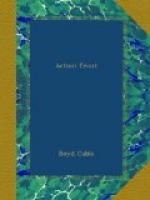The neutral ground at this period of Ainsley’s patrol was a sea of mud, broken by heaped earth and yawning shell-craters; strung about with barbed wire entanglements, littered with equipments and with packs which had been cut from or slipped from the shoulders of the wounded; dotted more or less thickly with the bodies of British or German who had fallen there and could not be reached alive by any stretcher-bearer parties. Unpleasant as was the coming in contact with these bodies, Ainsley knew that their being there was of considerable service to him. He and his men crawled in a scattered line, and whenever the upward trail of sparks showed that a flare was about to burst into light, the whole party dropped and lay still until the light had burned itself out. Any Germans looking out could only see their huddled forms lying as still as the thickly scattered dead; could not know but what the party was of their number.
It was necessary to move with the most extreme caution, because the slightest motion might eaten the attention of a look-out, and would certainly draw the fire of a score of rifles and probably of a machine-gun. The first part of the journey was the worst, because they had to cover a perfectly open piece of ground on their way to the slight depression which Ainsley knew ran curling across the neutral ground. Wide and shallow at the end nearest the British trench, this depression narrowed and deepened as it ran slantingly towards the German; halfway across, it turned abruptly and continued towards the German side on another slant, and at a point about halfway between the elbow and the German trench, came very close to an exploded mine-crater, which was the objective of this night’s patrol.
It was supposed, or at least suspected, that the mine-crater was being made the starting-point of a tunnel to run under the British trench, and Ainsley had been told off to find out if possible whether this suspicion was correct, and if so to do what damage he could to the mine entrance and the miners by bombing.
When his party reached the shallow depression, they moved cautiously along it, and to Ainsley’s relief reached the elbow in safety. Here they were a good deal more protected from the German fire than they could be at any point, because from here the depression was fully a couple of feet deep and had its highest bank next the German trench. Ainsley led his men at a fairly rapid crawl along the ditch, until he had passed the point nearest to the mine-crater. Here he halted his men, and with infinite caution crawled out to reconnoiter. The men, who had been carefully instructed in the part they were to play, waited huddling in silence under the bank for his return, or for the fusillade of fire that would tell he was discovered. Immediately in front of the crater was a patch of open ground without a single body lying in it; and Ainsley knew that if he were seen lying there where no body had been a minute before, the German who saw him would




